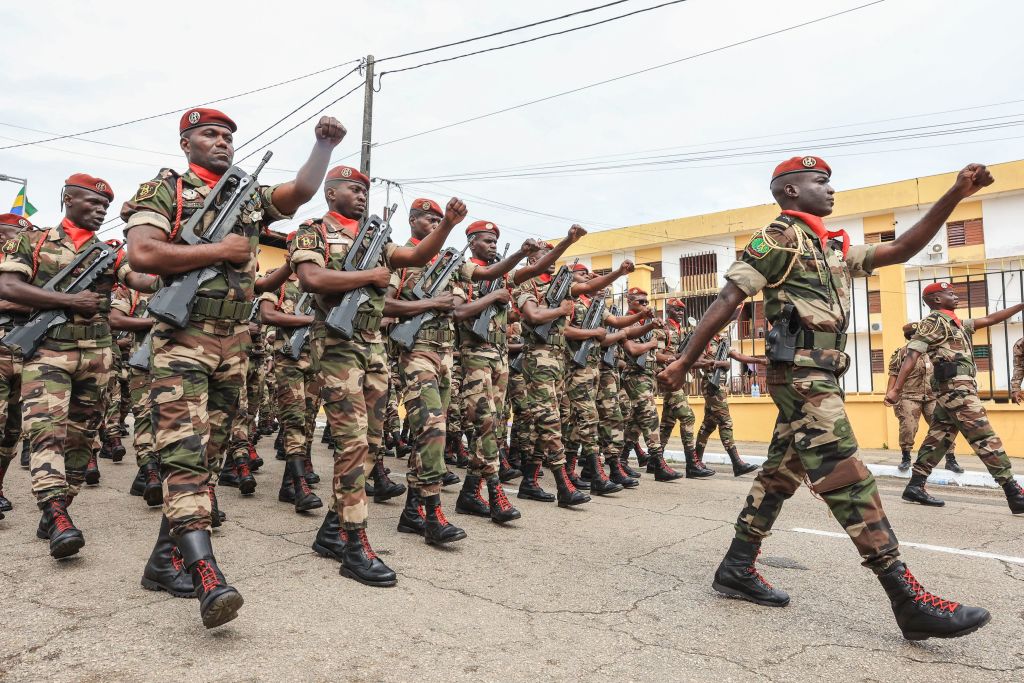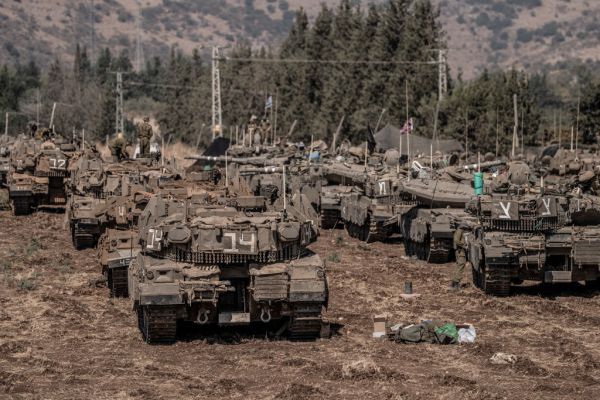Happy Wednesday! Politico asked the 2024 presidential candidates to make a list of 20 songs that “stir their soul” and give them “instant joy.”
Most obvious? Chris Christie picking Bruce Springsteen and Bon Jovi. Least obvious? Asa Hutchinson listing a song by P!nk.
Quick Hits: Today’s Top Stories
- Secretary of State Antony Blinken made a surprise visit to Kyiv on Wednesday, his third trip to the Ukrainian capital since the beginning of the war. “I’m here first and foremost to demonstrate our ongoing and determined support for Ukraine as it deals with this aggression,” said Blinken, who announced $1 billion in additional aid for Ukraine’s defensive war effort. The U.S. is reportedly preparing to provide Kyiv with depleted-uranium rounds, a controversial munition highly effective at destroying tanks. The visit comes on the heels of Russian missile attacks on Kyiv and an eastern Ukrainian town—the latter of which targeted a busy pedestrian shopping street, killing 17 people, including a child. Meanwhile, Romanian President Klaus Iohannis said on Wednesday that fragments of what may be a Russian drone were found on Romanian land, days after officials in Bucharest had “categorically denied” Ukrainian claims that a Russian drone had fallen in Romanian territory. If confirmed, Iohannis said, the development would represent “a serious violation of the sovereignty and territory of Romania, a NATO ally.”
- The U.S. Department of the Interior announced Wednesday it was canceling oil and gas leases in the Arctic National Wildlife Refuge that were bought from the federal government by an Alaskan state industrial development agency in the final days of the Trump administration. The Biden administration also said it would limit new leasing on roughly 40 percent of the National Petroleum Reserve in Alaska, the largest swathe of undisturbed public land in the country. The new regulations will not, however, affect a plan approved by the administration earlier this year to allow ConocoPhillips to drill in northern Alaska.
- A federal judge on Wednesday ordered Texas Gov. Greg Abbott to remove a floating barrier in the Rio Grande river designed to limit illegal border crossing, pending final judgment, granting the Justice Department’s request for a preliminary injunction. District Judge David Ezra, a Reagan appointee, gave the state until September 15 to remove the 1,000-foot barrier and barred officials from putting any new impediments in the river as the case makes its way through the courts. Abbott’s office immediately appealed the ruling.
- In the first in-person hearing in Fulton County District Attorney Fani Willis’ racketeering case against former President Donald Trump and 18 co-defendants, Judge Scott McAfee said former Trump lawyers Sidney Powell and Kenneth Chesebro could have their respective cases severed from the other defendants and signaled the two would be tried together on October 23. The ruling could be rendered moot, however, if other defendants succeed in removing the case from state to federal court. Willis’ office has suggested the trial could take longer than four months and that prosecutors—still hoping to try all 19 co-defendants together—expect to call more than 150 witnesses.
- Special counsel David Weiss intends to indict Hunter Biden by the end of the month, Wednesday court filings show. The filing was made in relation to a pretrial agreement—which fell apart several weeks ago—regarding Hunter’s purchase of a firearm while addicted to cocaine. President Joe Biden’s son had also agreed to plead guilty to tax charges as part of the deal that collapsed.
- Former Republican Rep. Mike Rogers officially announced Wednesday he is running for retiring Democratic Sen. Debbie Stabenow’s U.S. Senate seat in Michigan. Once the chair of the House Intelligence Committee, Rogers is the first entry in the GOP primary, though former Rep. Peter Meijer—heir to the Meijer grocery store chain and one of just 10 Republicans to vote in favor of impeaching Trump in January 2021—launched an exploratory committee last week, likely the precursor to a run. The crowded Democratic primary field is currently led by Rep. Elissa Slotkin.
More Notches in the Coup Belt

Gabon’s presidential election officially ended last Wednesday with the Gabonese election authority declaring the incumbent Ali Bongo the victor. But within minutes, a group of military officers had placed Bongo under arrest and announced on national television they were seizing power and dissolving the country’s parliament. Gen. Brice Clotaire Oligui Nguema—the head of Gabon’s Republican Guard and Bongo’s cousin—led the takeover, and he swore himself in as a transitional president on Monday.
The coup is the latest in a string of putsches across west and west central Africa that spell trouble for nascent democratization efforts and create greater instability in a region plagued by extremist violence. All the while, France’s influence on the continent recedes, removing a once stabilizing force in the so-called “coup belt.”
Gabon’s coup comes just weeks after a military takeover in Niger deposed the democratically elected president of that country, Mohamed Bazoum. As we wrote last month:
The West is running out of partners in the region. “Niger has increasingly been seen as one of the last bastions in the Sahel [and] West Africa that was crucial for counterterrorism but also seemed to be showing more optimistic signs about governance and democracy,” Vanda Felbab-Brown, the co-director of the Brookings Institution’s Africa Security Initiative, tells TMD. The country’s neighbors to the West along the Sahel—a strip of semi-arid land below the Sahara Desert—have struggled with insurgent violence and political instability. Mali and Burkina Faso have experienced two coups each since 2020. France ended a nine-year military mission in Mali last year due largely to the coup, and the junta in Burkina Faso pushed out French forces earlier this year. Niger itself has seen 5 coups since gaining independence from France in 1960—before last week, the most recent military coup occurred in 2010.
The “coup belt” has certainly lived up to its reputation in recent years: Since 2020, there have been eight military takeovers—in Guinea, Burkina Faso, Mali, Niger, Chad, and Sudan. Not since the early post-colonial period of the 1960s and ‘70s has Africa witnessed such a quick succession of putsches. Why so much turmoil in such a short period?
“If you add up the number of coups, there certainly would seem to be a trend line,” J. Peter Pham—a former U.S. envoy for the Sahel—tells TMD. But he sees efforts to draw sweeping conclusions from developments throughout a number of countries as misguided. “What happened in Guinea is entirely different from what happened in Burkina Faso is entirely different from what happened in Niger,” Pham argues.
Gabon in particular appears to be an outlier. The country is not only geographically separate from the Sahel countries, but it’s wealthier, too, with its GDP per capita several times greater than other countries that have experienced coups recently. Gabon doesn’t face much of a terrorist insurgency problem, and it isn’t particularly democratic—last week’s election was contested by opposition leaders. The country had been ruled by the same family for more than a half century (Bongo succeeded his father Omar in 2009 who had headed the country since 1967). Early reports suggest the coup reflected more of an internal succession struggle within the Bongo family than popular support for ousting the president—the junta placed Ali Bongo under house arrest and arrested one of his sons on charges of treason.
Sahel nations do, however, share some common problems, including the severe poverty and extremist violence that has put pressure on ruling governments. Guinea, Burkina Faso, Mali, Niger, and Chad all rank among the poorest nations in the world, with millions of people in their respective populations facing food insecurity. In the West, particularly Burkina Faso and Mali, terrorist violence has also surged in recent years. Fighting between the Islamic State Sahel Province, the al-Qaeda-affiliated Jamaa Nusra al-Islam wa al-Muslimin (JNIM), and government forces and allied groups last year reached the highest levels ever recorded by the Armed Conflict Location and Event Data Project—a trend only made worse by the French military’s exits from both countries. Roughly half of Burkina Faso’s territory is now outside of government control.
“The case in Burkina Faso, Mali, and Niger is really unusual in that [these] three countries are locked in these terrible conflicts that are killing a lot of people and creating a lot of frustration and a lot of incomprehension,” Michael Shurkin, a former CIA analyst and a nonresident fellow at the Atlantic Council’s Africa Center, tells TMD. “It’s encouraging people to be critical and impatient with their governments, which creates an opportunity for a coup.” More than half of respondents in 2021-2022 surveys by Afrobarometer—a non-profit polling group headquartered in Ghana—expressed tolerance for military intervention if elected officials abuse their power. There was a demographic divide on this question, with 56 percent of 18- to 35-year-olds favoring military intervention compared to only 48 percent of those over 55.
And the dissatisfaction is likely to worsen as the countries’ disproportionately young populations come of age—nearly half of Burkina, Mali, and Niger’s total populations are aged fourteen or younger. “They have very young populations in all of these countries,” Shurkin says. “Countries like Mali and Niger, they’re not really going to have memories of what it used to be like when they had military regimes or juntas, or how they had these very violent transitions to democracy in the 1990s that need to be protected and preserved.” Consequently, most of the coups have been relatively bloodless and have not faced significant popular opposition.
But the ultimate driving factor in military takeovers is the putschists themselves. Coups are usually the result of political decisions by a small faction of people, often involving personal ambitions and local jockeying for power. “It’s a tactic,” Kristen Harkness—a professor of international relations at the University of St. Andrews specializing in Africa studies—tells TMD. “Coups are a means of seizing power. They’re not an end in and of themselves.” The militaries also nurse grievances over the struggle against extremists, often having suffered significant combat losses—several of the juntas cited the conflicts as justification for taking power. Niger—a country that has fared comparatively better in the fight against Islamist insurgencies thanks in part to its security cooperation with France and the U.S.—provides an example of the divergence between the junta’s rhetoric about security to justify a coup, and its behind-the-scenes motivations. (Observers have speculated that Bazoum’s planned military shakeup motivated the coup leader General Abdourahamane Tiani to take control.)
In previous decades, would-be coupists had to contend with the possibility of French intervention to stop or reverse a takeover. Into the 2000s, France played a very active security role in former French colonies (which include most Sahel countries), frequently stepping in to reverse coups. France “will intervene each time an elected democratic power is overthrown by a coup d’etat if a military cooperation agreement exists,” then French Minister for Foreign Assistance Jacques Godfrain said in 1995. The country did intervene but often to prop up authoritarian regimes friendly to French commercial interests, a record that stoked anti-French sentiment in the region.
French President Emmanuel Macron has continued a marked departure from that policy for years—in a 2017 speech, Macron declared he was “of a generation that doesn’t come to tell Africans what to do.” France has instead pursued a strategy of reducing its military footprint in Africa and focusing more on partnering with and training local militaries, but the repositioning has ended in sharp breaks with Mali, Burkina Faso, and Niger. “There’s this political stabilization role that France used to play that France is not playing anymore,” Shurkin tells TMD. “An unfortunate, unintended consequence is that it’s made coups more likely, not less, just by virtue of the fact that the French aren’t playing this role.” Harkness agrees, saying, “The way that the French have reacted to this series of coups in 2020 to 2021 has basically demonstrated to all of the African leaders of militaries in Francophone Africa that that security guarantee and that coup deterrent is just gone.”
The new juntas have put France and the U.S. in a challenging position, leaving them without a strong partner for counterterrorism efforts in the region. “Symbolically and politically, this situation marks a strong decline for France,” said Dominique de Villepin—a former Prime Minister of France under President Jacques Chirac. France has strongly condemned the coup in Niger, for example, while the junta has demanded the exit of the approximately 1,500 French troops stationed in the country. The U.S., while calling for the restoration of democratic rule, has adopted a less combative posture and has yet to label the takeover a coup. “We’re still pursuing what we believe to be potentially viable diplomatic solutions here to see that democratic institutions are respected in both countries,” John Kirby—a spokesperson for the National Security Council—said Friday of the coups in Niger and Gabon.
But as new military regimes come to power unopposed, more instability could be coming down the road. “My fear has been confirmed in Gabon that copycats will start doing the same thing until it is stopped,” Nigerian President Bola Tinubu—who chairs West Africa’s main regional body ECOWAS—said last week. And people living in the Sahel are likely to experience more violence in displacement—Russia’s Wagner mercenaries are already lurking in the wings, waiting to gain a stronger foothold in the region. “Military juntas are terrible at governance, just terrible,” Harkness tells TMD. “It doesn’t bode well for these countries which are struggling anyway with governance.”
Worth Your Time
- Tennis—a game at which Eastern Europeans and Russians have achieved remarkable success—is caught in the crossfire of Moscow’s invasion of Ukraine. “Perhaps no sport has been affected as profoundly,” Michael Steinberger reports for the New York Times Magazine. “That is a function of numbers—there are lots of players from both countries—and proximity. At tennis tournaments, the locker rooms, lounges and practice facilities are shared, and it can be hard to avoid people you would rather not see. Russia’s attack on Ukraine plunged professional tennis into a cold war of its own, one that had destroyed friendships and sown animosity and mistrust on and off the court. The Russians and Belarusians were designated as neutral athletes; tennis’s governing bodies were not allowing them to compete under their national flags.” Some former high-profile players have traded in a racket for a gun, including Sergiy Stahovsky, a Ukrainian who famously beat Roger Federer in 2013. “Stakhovsky is a member of special operations for the Security Service of Ukraine. His unit, he says, is heavily involved in the fighting and deploys a range of weapons—mortars, javelin and stinger missiles, drones. He told me that he was vacationing in Dubai with his family when the war started. The city was hosting a men’s tournament that week. Stakhovsky had not lived in Ukraine since he was 12. But with his country under attack, he felt obliged to join the war effort. He left Dubai and arrived in Kyiv on Feb. 28, four days after the Russians invaded. ‘I did not have any other option,’ he said. ‘I could not imagine sitting outside of Ukraine and screaming for other people to help Ukraine.’”
Presented Without Comment
Bloomberg: China Considers Law Banning Clothes That ‘Hurt Feelings’ of Others
Also Presented Without Comment
Reason: Two-Thirds of College Students Think Shouting Down A Public Speaker Can Be Acceptable
Toeing the Company Line
- Our Monthly Mailbag (🔒) feature has returned, and it’s Managing Editor Michael Reneau’s turn to answer member questions. Drop any you have in the comments here.
- In the newsletters: The Dispatch Politics crew covers Mike Pence’s battle against populism in the GOP, Jonah bemoans (🔒) the rotten self-indulgence of the right, and Nick explains why (🔒) Joe Biden obviously shouldn’t talk about Trump’s indictments on the campaign trail—unless maybe he should.
- On the podcasts: Chris joins Jonah on The Remnant for a deluge of rank punditry, while David French and guest host David Lat discuss Wisconsin’s Supreme Court mess and whether Trump’s trials should be televised on the latest Advisory Opinions.
- On the site today: Kevin pens an opus on the Ken Paxton impeachment trial, Charlotte reports on Ukraine’s expanding domestic defense sector, and Andrea Stricker explains how Congress can rein in the Biden team’s behind-the-scenes nuclear talks with Iran.
Let Us Know
What role, if any, should countries like France play in protecting political stability in former colonies?









Please note that we at The Dispatch hold ourselves, our work, and our commenters to a higher standard than other places on the internet. We welcome comments that foster genuine debate or discussion—including comments critical of us or our work—but responses that include ad hominem attacks on fellow Dispatch members or are intended to stoke fear and anger may be moderated.
You are currently using a limited time guest pass and do not have access to commenting. Consider subscribing to join the conversation.
With your membership, you only have the ability to comment on The Morning Dispatch articles. Consider upgrading to join the conversation everywhere.